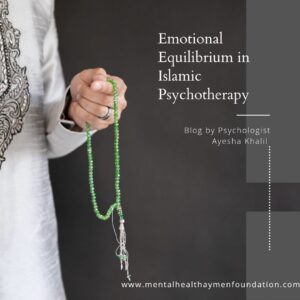Emotional Equilibrium in Islamic Psychotherapy

Emotional Equilibrium in Islamic Psychotherapy: A Case Study
Aylin, one of the patients, who has some childhood emotional injury, discussed her mother during the therapy. She recalled specific experiences of rejection, lack of care and affection and how these experiences influenced her affective and cognitive processing. In the current case, the therapist who practiced Traditional Islamically Integrated Psychotherapy (TIIP) used several techniques to assist Aylin in processing her primary suffering.
The process started with Emotional Equilibrium (Ihsasi I’tidal); thus, the chair work based on EFT was modified according to the Islamic approach. During these sessions, Aylin mimed conversations with her mother’s image, which symbolized unprocessed emotions. It enabled her to channel and experience her primary feelings such as sadness, feeling hurt, and adaptive anger. Another technique applied was guided imagery (tasawwur) in which Aylin focused on a kindly figure—substituted by the Prophet Muhammad (PBUH)—to heal her emotional pain.
The therapy also treated Cognitive Equilibrium (Aqlani I’tidal). Aylin had negative schemas from childhood experiences that have been supported by the repetition and maladaptive patterns that she had. After emotional regulation, the therapist helped Aylin to dispute these schemas and develop more adaptive cognitive structures.
The final stage of this development was Interpersonal Equilibrium (Ijtima’i I’tidal) when Aylin worked on relationships. She let go of her anger towards her mother but drew the line and did not want to see her stepfather. Also, she became more intimate with her husband and compassionate towards him, because of the openness she displayed.
Last of them was Spiritual Equilibrium (Ruhani I’tidal) which was attained through spiritual exercises. Thus, to be able to focus on the aspects of the blessings, values, and goals, Aylin wrote a diary. She also used the Six M’s of behavioral change – setting goals, monitoring, and managing one’s behavior – based on the Islamic faith. They strengthened her psycho-spiritual capital, which helped her to perceive challenges as blessings.
Aylin’s case shows how TIIP is a person-centred approach that encompasses emotional, cognitive, interpersonal, and spiritual aspects. It demonstrates how Islamic psychotherapy can be used to treat psychological disorders.
